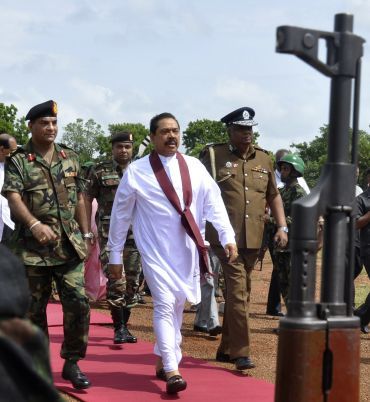 British Prime Minister David Cameron on Friday made a historic visit to the former war zone of Jaffna to "shine a light on the chilling events" during the last phase of the war against the Liberation Tigers of Tamil Eelam, hours after Sri Lankan President Mahinda Rajapaksa cautioned against turning the Commonwealth into a "punitive and judgemental body".
British Prime Minister David Cameron on Friday made a historic visit to the former war zone of Jaffna to "shine a light on the chilling events" during the last phase of the war against the Liberation Tigers of Tamil Eelam, hours after Sri Lankan President Mahinda Rajapaksa cautioned against turning the Commonwealth into a "punitive and judgemental body".
Cameron, the first foreign head of government to visit war-ravaged Jaffna since Sri Lanka's independence in 1948, flew in on an air force plane as the the kin of the dead and missing held street protests against the island's government.
"I am the first PM or president to go to the north of Sri Lanka since 1948 (when the country got independence from Britain). I want to shine a light on the chilling events there first hand," he tweeted after meeting staff of the Tamil daily "Udayam", which has been repeatedly raided by the government.
"Proud to meet the brave journalists risking their lives to put out a daily paper in (northern) Sri Lanka," he added. Cameron's visit drew the spotlight away from the summit of the 53-member grouping after Rajapaksa, who has been facing international criticism over rights violations, made a combative speech at the opening ceremony.
"If the Commonwealth is to remain relevant to its member countries, the association must respond sensitively to the needs of its peoples and not let it turn into a punitive or judgemental body," he said.
In an apparent attack on countries like Britain and Canada which have made strong public comments against the rights violations, Rajapaksa said, "We must also collectively guard against bilateral agenda being introduced into the organisation, distorting Commonwealth tradition and consensus...Our deliberations in Colombo must lead to the greatest practical benefits for the peoples of a renewed Commonwealth, one that is engaging, collective and unifying, rather than prescriptive and divisive."
As a debate raged over Sri Lanka hosting the three-day summit in the face of allegations of human rights violations towards the end of the war in 2009, External Affairs Minister
Salman Khurshid attended the conference after Prime Minister Manmohan Singh dropped plans to go to Jaffna and Colombo because of strong opposition in Tamil Nadu.
His Canadian and Mauritian counterparts Stephen Harper and Navin Chandra Ramgoolam decided to boycott the summit, citing the host's poor human rights record.
Asked about Cameron's visit to Jaffna, Khurshid replied: "Is it not sad? I wanted my prime minister to go there. I was the second foreign minister to go there (after the war). But who do I blame for it."
He said he was disappointed that he could not take the Prime Minister to a place in the Tamil-dominated Northern Province where India is building 50,000 houses and laying roads. "We can't show this to him (PM)," Khurshid said.
Asked who he would blame, Khurshid said he did not want to blame anyone. "Let people judge whether their (those who objected to the PM going to Jaffna and Colombo) strategy has brought any good. My government's objective is to get the Sri Lankan Tamils back on their feet and have self-confidence."
To another question, he said India too has conveyed its concerns over rights violations to the Sri Lankan government. "Our stand has been exactly that there has to be truth and reconciliation. These are serious concerns and you need to address their concerns. But these have to be addressed within Sri Lanka and not in New Delhi or in Washington.
"We can only express our views. It should be addressed by the people and government of Sri Lanka. Our job is to help them and incentivise them. Sri Lanka is a sovereign government and it is their responsibility," he said.











 © 2025
© 2025